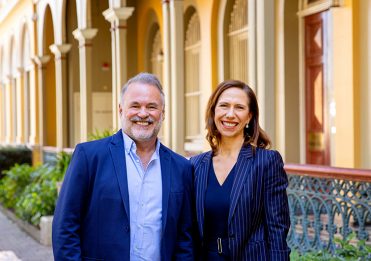However, as historian Professor Peter Stearns and others have argued the study of history is ‘indispensable’, even if its benefits to young people contemplating their future may appear less tangible or immediate than other disciplines.
Girls Grammar students understand that spending time learning about the past goes beyond merely improving our knowledge of significant historical events and milestones. Importantly, history provides a deep understanding of how we behave as individuals and communities, which in turn provides insights into the future.
Last week, the School welcomed Ms Jo-Anne Cameron from the Queensland History Teachers’ Association (QHTA) to present awards to students with winning entries in the 2018 QHTA Historical Writing Competition. Ms Cameron shared the idea that it is only when we know what we are looking at that we truly know what we are seeing. Recalling an experience of being in Italy and looking at what appeared to be an ordinary balcony, Ms Cameron knew this to be the balcony from which Mussolini had addressed the Italian people in the 1940s, declaring war on Great Britain, and therefore understood more fully what she was seeing. She explained that the lens through which we view and understand our world is shaped by our understanding of history.
Fundamentally, history is about change, allowing students to transcend their own life experiences to gain an understanding of how humanity has evolved and developed over centuries, millennia even. Through no other field of study can we gain access to what Professor Stearns refers to as the ‘laboratory of human experience’, emerging with diverse and relevant knowledge, a capacity for informed citizenship and an awareness of how humans, and the world in which we exist, has evolved and now functions.
As workplaces seek minds ready to tackle the world’s most pressing issues, the study of history is essential to the development of critical thinking and empathetic understanding. Knowing why we require a certain technology and how best to offer a solution that will be adopted by users for good ends is as important as knowing how to develop the technology itself.
While an understanding of international history is crucial in our globalised world, Australia’s distinct history is uniquely important in shaping our identity—who we are as a society—and what we are striving to become. It is our shared experiences and culture—our history—that unites us.
In his Remembrance Day address at this week’s Assembly, Head of English, Mr Stephen Woods argued that we have a duty to remember, an obligation to those who served our nation to honour their sacrifices. Without understanding why the events of war occurred or their impact on those who served, we can neither demonstrate true compassion and empathy nor learn from these episodes in the hope of avoiding them in the future.
Whether supporting moral contemplation, shaping identity, promoting social responsibility or, in its most basic form, providing factual information about the background of society, the study of history is essential. It remains a subject in which our girls are deeply engaged. They appreciate that we must understand where we have come from to genuinely understand where our next chapter might lead.
As we prepare to farewell our Year 12 girls in just two short weeks, I know their time at our School will form a significant part of their personal history as they will always be an important part of ours.
Ms Jacinda Euler
Principal



